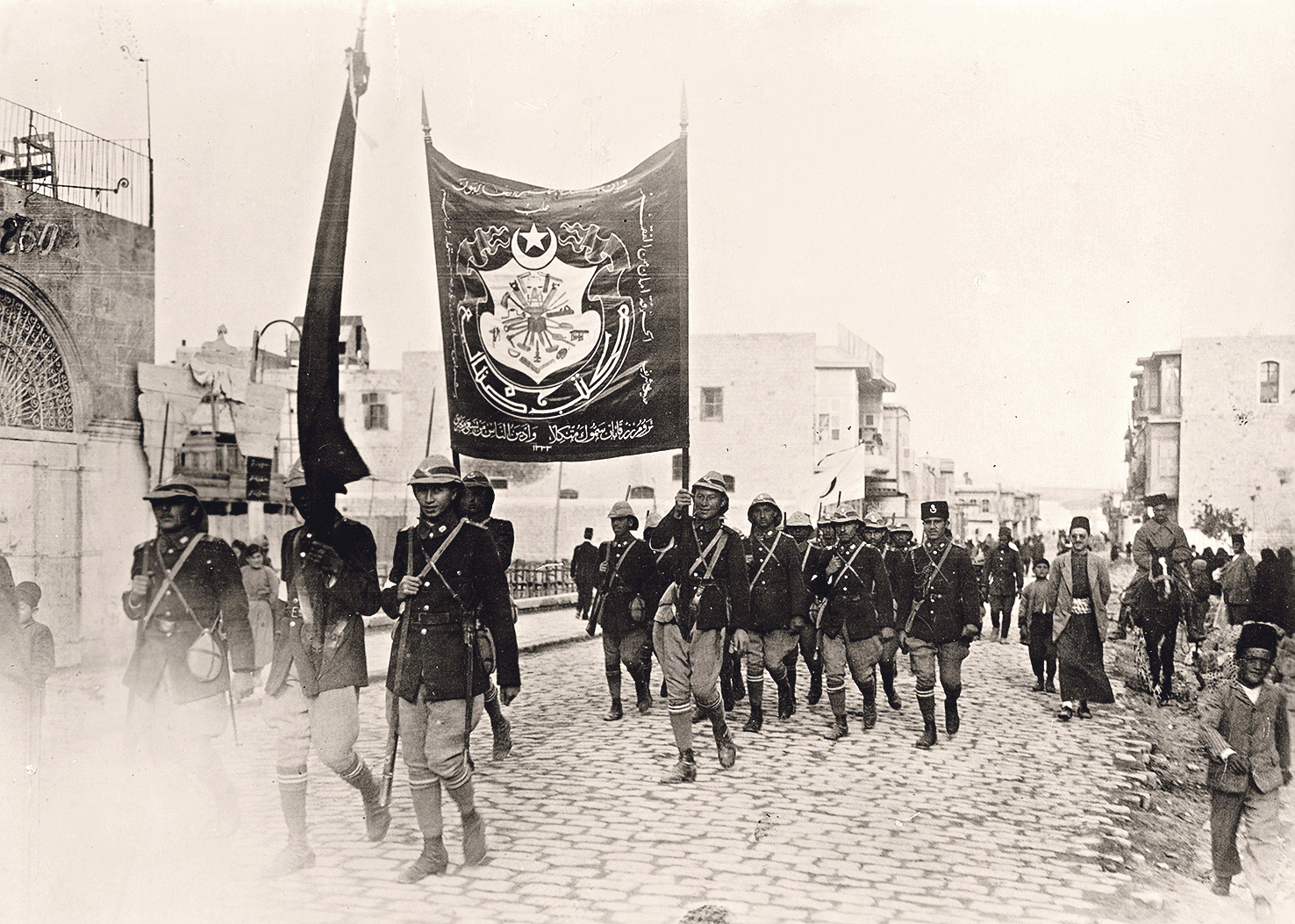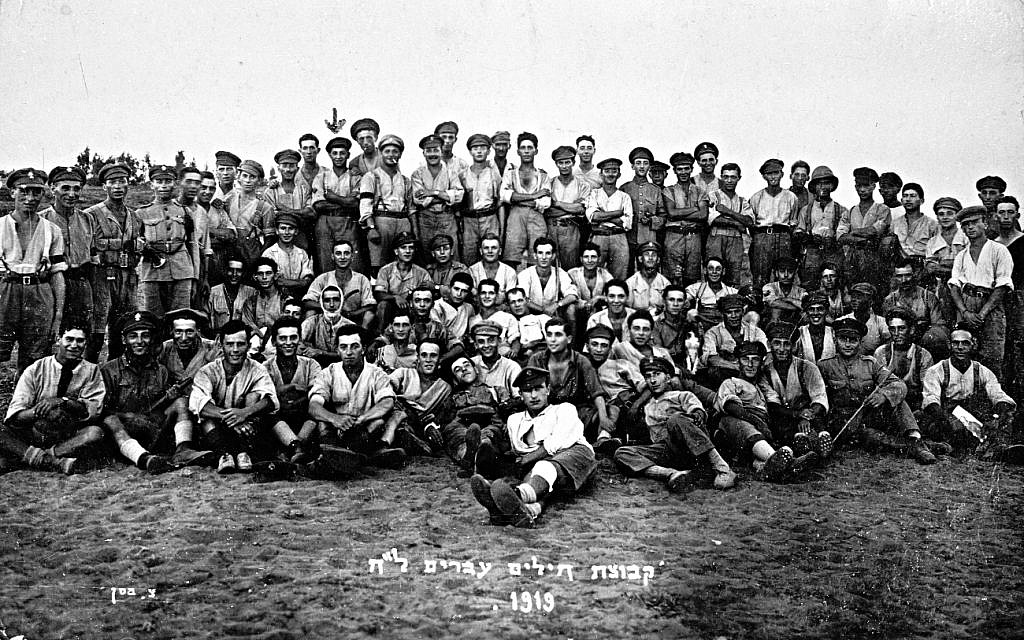Making of a Mandate: Marking 100 years since the ‘liberation of Palestine’
One hundred years ago this week the British liberated Palestine from the Ottomans, laying the foundations for Israel’s birth
The words ‘liberation of Palestine’ might these days be heard from an Iranian mullah or a Hamas commander, but 100 years ago, long before the state of Israel came into being, it was a British Army objective – and British Jews helped achieve it.
It is the summer of 1918, and the historic land of Palestine is held by Ottoman Turks, who are being pushed back into a corner of their dwindling empire. Among their enemies, stationed in a forward position 20 miles north of Jerusalem, are British Jews of the Royal Fusiliers ‘Jewish Legion’, including dozens of East End tailors, plus a Zionist leader, Captain Ze’ev Jabotinsky.
Six months earlier, British Jews of mainly Russian origin had joined the 38th Battalion of the Royal Fusiliers, marching through the City of London and Whitechapel with fixed bayonets, a special privilege, and setting sail for Egypt, where they joined an Irish division, training and awaiting orders.
Get The Jewish News Daily Edition by email and never miss our top stories Free Sign Up
They were in high spirits.
A few months before, in November 1917, Lord Balfour had prompted the British Government to write to Lord Rothschild announcing support for the establishment of a “national home for the Jewish people” in Palestine.
“The existence of a Jewish Legion aroused great interest,” says Professor Colin Shindler of the School of Oriental and African Studies. “Even Isaac Rosenberg, the First World War poet, applied to join the Legion – but he was killed at Arras before his transfer.”
It all seemed a far cry from 1915 and the formation of the Zion Mule Corps, the first regular Jewish fighting force (complete with Jewish emblem and flag) to take active part in a war since the defeat of the Bar Kochba Revolt 2,000 years ago. This force was led by a charismatic Irish Protestant, Col. John Patterson, who had read the Hebrew Bible and identified with the figure of Joab, who led King David’s army.
Patterson later commanded the 38th Battalion too. He knew his men fought with the backing of Jewish families back home, who held fundraisers “for our boys fighting in Palestine”.
Some of these men, who now stared down at the Ottoman forces from nearby hills, would later form the core of what became the modern Israeli army.
The Jewish Royal Fusiliers battalion’s very existence “was a momentous and iconic moment in Jewish history,” says military historian Martin Sugarman. “It would be only the second time since the destruction of the Temple in Jerusalem and the loss of Jewish statehood, that an independent Jewish fighting unit had been formed, with its own banner and later its own cap badge with the famous Menorah and Kadimah design.”
The pragmatic British needed help from wherever it could be found, and many see the Balfour Declaration in this light. “The notion of a Jewish Legion ran parallel with this sudden British enthusiasm for a declaration of support for the Zionists,” says Shindler. “It seemed to fit with British strategic objectives at the time – to defeat the Turks, secure British suzerainty over Palestine, and divide up the Ottoman Empire between the imperial powers.”

Illness soon struck the 800-strong Jewish force. After attacking the Turks with their offensive, the men were sent to the tropical Jordan Valley, where malaria took hold, reducing their number of ‘fighting fit’ to a mere 150, just days before the battles for which they would later be known.
Those battles began on 19 September. The remains of Jabotinsky’s conscripts and volunteers teamed up with their Jewish sister Battalion of the 39th Royal Fusiliers, comprised of mainly American Jewish soldiers commanded by the Canadian-born Jew Lt Col. Eliezer Margolin. Fighting alongside them were soldiers from India, the Caribbean, Australia and New Zealand, a total of 11,000 men. They were told to capture the Jisr ed Damieh Bridge and various fords across the River Jordan, cutting lines of communication between the Ottoman Army on the west bank of the river, and the Ottoman Fourth Army to the east, defending what is now Jordan.
The Jewish soldiers’ first attempt failed, but they were ordered back, to succeed “at all costs”. They did, capturing the Mellaha position, allowing the Americans to march on. General Chaytor, a commander under General Allenby, whose men took the (now) Jordanian capital of Amman just days later, told the Jewish Legionnaires after that “by forcing the Jordan fords you helped in no small measure to win the great victory gained at Damascus”.
It could have been very different. Those same Jewish soldiers could easily have been fighting against a young David Ben-Gurion, or indeed alongside Ben-Gurion against the British, because in 1914 Israel’s future leader had asked the Turks if he could form a ‘Jewish Legion’ attached to the Ottoman Army, before the Turks had decided to enter the war on the German side. This was approved, so he and dozens of others began training, but within weeks most of the Jews were rounded up by the Turks up to 20,000 deported, mostly to Alexandria in Egypt.
It was here that Jabotinsky first met Joseph Trumpeldor, a veteran of the Russo-Japanese War who co-founded the Zion Mule Corps, and who saw action at Gallipoli. “They instituted a police force in the camp,” says Shindler. “This small group became the nucleus for the Jewish Legion.”
Trumpeldor later established a Jewish youth movement preparing early Zionists to settle in Eretz Israel, which would soon be needed. By late October 1918, the Ottomans had surrendered to the Allies, who carved up the Middle East between the French and British. Palestine went to Britain. Some British Jewish soldiers returned home; others stayed, joining Russian, American, Canadian and Argentinian Jews in a fighting force now called the ‘Judean Regiment’ of the Royal Fusiliers – with a menorah insignia – still under British Army command. It was a rallying cry. Soon Jews from places such as Salonika, Transylvania, even ‘mountain Jews’ from Dagestan, were applying to join.
But there was a problem. The British had raised Jewish hopes of reclaiming their ancestral homeland after the war, but Arab tribes who helped the British defeat the Ottomans had been offered the same land too.
Keen to avoid trouble, the British quietly disbanded the Judean Regiment, assigning men to other divisions or demobilisation. When anti-Jewish riots broke out in places like Jaffa, Jewish soldiers were kept away. Breakaway groups fostered by Jabotinsky were arrested and imprisoned.
It was only years later that Jewish self-defence groups begin to militarise – the beginnings of the IDF.
LISTEN to this week’s episode of the Jewish Views Podcast!

Thank you for helping to make Jewish News the leading source of news and opinion for the UK Jewish community. Today we're asking for your invaluable help to continue putting our community first in everything we do.
For as little as £5 a month you can help sustain the vital work we do in celebrating and standing up for Jewish life in Britain.
Jewish News holds our community together and keeps us connected. Like a synagogue, it’s where people turn to feel part of something bigger. It also proudly shows the rest of Britain the vibrancy and rich culture of modern Jewish life.
You can make a quick and easy one-off or monthly contribution of £5, £10, £20 or any other sum you’re comfortable with.
100% of your donation will help us continue celebrating our community, in all its dynamic diversity...
Engaging
Being a community platform means so much more than producing a newspaper and website. One of our proudest roles is media partnering with our invaluable charities to amplify the outstanding work they do to help us all.
Celebrating
There’s no shortage of oys in the world but Jewish News takes every opportunity to celebrate the joys too, through projects like Night of Heroes, 40 Under 40 and other compelling countdowns that make the community kvell with pride.
Pioneering
In the first collaboration between media outlets from different faiths, Jewish News worked with British Muslim TV and Church Times to produce a list of young activists leading the way on interfaith understanding.
Campaigning
Royal Mail issued a stamp honouring Holocaust hero Sir Nicholas Winton after a Jewish News campaign attracted more than 100,000 backers. Jewish Newsalso produces special editions of the paper highlighting pressing issues including mental health and Holocaust remembrance.
Easy access
In an age when news is readily accessible, Jewish News provides high-quality content free online and offline, removing any financial barriers to connecting people.
Voice of our community to wider society
The Jewish News team regularly appears on TV, radio and on the pages of the national press to comment on stories about the Jewish community. Easy access to the paper on the streets of London also means Jewish News provides an invaluable window into the community for the country at large.
We hope you agree all this is worth preserving.
-
By Laurent Vaughan - Senior Associate (Bishop & Sewell Solicitors)
-
By Laurent Vaughan - Senior Associate (Bishop & Sewell Solicitors)
-
By Laurent Vaughan - Senior Associate (Bishop & Sewell Solicitors)
-
By Laurent Vaughan - Senior Associate (Bishop & Sewell Solicitors)






















